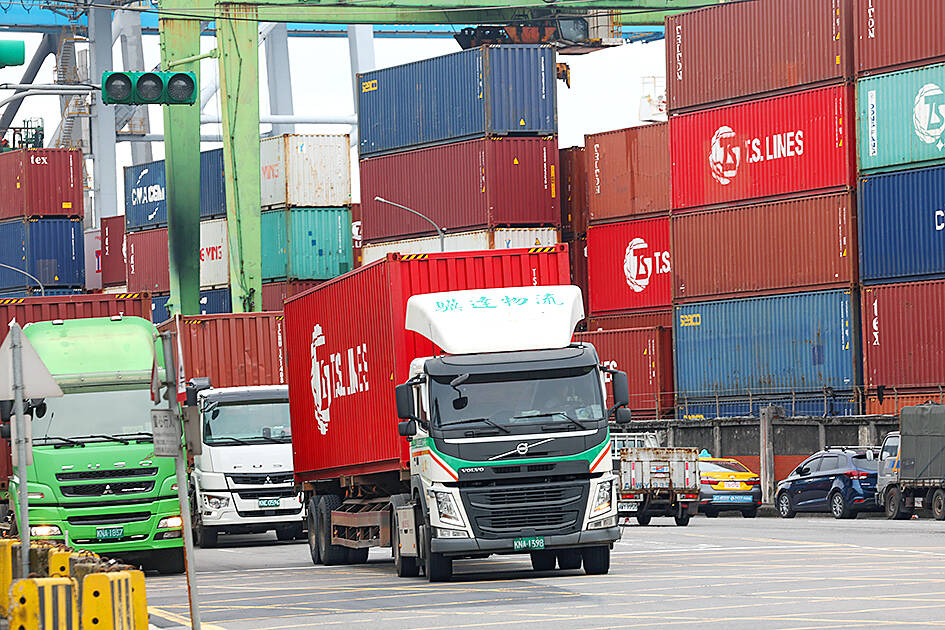Exports last month soared 18.9 percent year-on-year to US$41.82 billion, the highest for March, as demand for artificial intelligence (AI) products thrived, while the market for non-tech products improved, the Ministry of Finance said yesterday.
It is the first time in 19 months that exports rose above the US$40 billion mark, and they are expected to advance 8 percent to 11 percent this month, as the recovery gains further momentum, Department of Statistics Director-General Beatrice Tsai (蔡美娜) said.
The trade data last month was better than expected, thanks to fast-growing demand for AI, restocking demand for non-tech products and a low comparison base, Tsai said.

Photo: CNA
Shipments of information and communication technology (ICT) products in particular more than doubled to US$12.65 billion, accounting for 30.3 percent of overall exports, she said.
However, exports of electronic components, mainly chips, fell 5.5 percent to US$14.7 billion, which Tsai attributed partly to product reclassifications.
“It is perhaps better to combine electronics and ICT shipments to capture the latest technology cycle movements, which lent support to a more than 30 percent recovery,” she said.
Demand for ICT products came mostly from the US where major technology firms are speeding up the development of AI tools and services, she said, adding that the US was the nation’s second-largest trading partner with a 21.8 percent share of Taiwan’s total outbound shipments.
Shipments to China fell 1.3 percent to US$12.72 billion with a softening share of 30.4 percent, Tsai said, as Taiwanese firms rally behind US bans on sales of advanced technology products to China.
Exports to ASEAN markets soared 47.1 percent to US$2.66 billion with Thailand, Vietnam and elsewhere in the trade bloc benefiting from an ongoing realignment of the global electronics supply chain, she said.
Meanwhile, shipments of base metal, chemical, mineral and textile products gained 0.8 percent to 7 percent, emerging from a prolonged slowdown induced by sharp global inflation and monetary tightening, she said.
“The recovery will grow stronger and more broad-based,” she said.
Imports posted a 7.1 percent increase to US$33.14 billion, helped by fleet expansions by domestic airline companies to take advantage of rising demand for cross-border travel, Tsai said.
The positive showing in imports came even though purchases of capital equipment fell 12.6 percent overall, while the acquisition of semiconductor equipment plunged 50.1 percent, she said.
That was because local tech firms were cautious in capacity and inventory management, especially as interest rates remain high and geopolitical risks abound, she said.
The latest trade data gave Taiwan a surplus of US$8.68 billion last month, more than doubling from a year earlier, the ministry said.
In the first quarter, exports rose 12.9 percent year-on-year to US$110.33 billion, while imports increased 3 percent to US$91.38 billion, beating the government’s February forecast of an 8.36 percent rise and a 0.4 percent decline respectively.

MULTIFACETED: A task force has analyzed possible scenarios and created responses to assist domestic industries in dealing with US tariffs, the economics minister said The Executive Yuan is tomorrow to announce countermeasures to US President Donald Trump’s planned reciprocal tariffs, although the details of the plan would not be made public until Monday next week, Minister of Economic Affairs J.W. Kuo (郭智輝) said yesterday. The Cabinet established an economic and trade task force in November last year to deal with US trade and tariff related issues, Kuo told reporters outside the legislature in Taipei. The task force has been analyzing and evaluating all kinds of scenarios to identify suitable responses and determine how best to assist domestic industries in managing the effects of Trump’s tariffs, he

TIGHT-LIPPED: UMC said it had no merger plans at the moment, after Nikkei Asia reported that the firm and GlobalFoundries were considering restarting merger talks United Microelectronics Corp (UMC, 聯電), the world’s No. 4 contract chipmaker, yesterday launched a new US$5 billion 12-inch chip factory in Singapore as part of its latest effort to diversify its manufacturing footprint amid growing geopolitical risks. The new factory, adjacent to UMC’s existing Singapore fab in the Pasir Res Wafer Fab Park, is scheduled to enter volume production next year, utilizing mature 22-nanometer and 28-nanometer process technologies, UMC said in a statement. The company plans to invest US$5 billion during the first phase of the new fab, which would have an installed capacity of 30,000 12-inch wafers per month, it said. The

Taiwan’s official purchasing managers’ index (PMI) last month rose 0.2 percentage points to 54.2, in a second consecutive month of expansion, thanks to front-loading demand intended to avoid potential US tariff hikes, the Chung-Hua Institution for Economic Research (CIER, 中華經濟研究院) said yesterday. While short-term demand appeared robust, uncertainties rose due to US President Donald Trump’s unpredictable trade policy, CIER president Lien Hsien-ming (連賢明) told a news conference in Taipei. Taiwan’s economy this year would be characterized by high-level fluctuations and the volatility would be wilder than most expect, Lien said Demand for electronics, particularly semiconductors, continues to benefit from US technology giants’ effort

‘SWASTICAR’: Tesla CEO Elon Musk’s close association with Donald Trump has prompted opponents to brand him a ‘Nazi’ and resulted in a dramatic drop in sales Demonstrators descended on Tesla Inc dealerships across the US, and in Europe and Canada on Saturday to protest company chief Elon Musk, who has amassed extraordinary power as a top adviser to US President Donald Trump. Waving signs with messages such as “Musk is stealing our money” and “Reclaim our country,” the protests largely took place peacefully following fiery episodes of vandalism on Tesla vehicles, dealerships and other facilities in recent weeks that US officials have denounced as terrorism. Hundreds rallied on Saturday outside the Tesla dealership in Manhattan. Some blasted Musk, the world’s richest man, while others demanded the shuttering of his